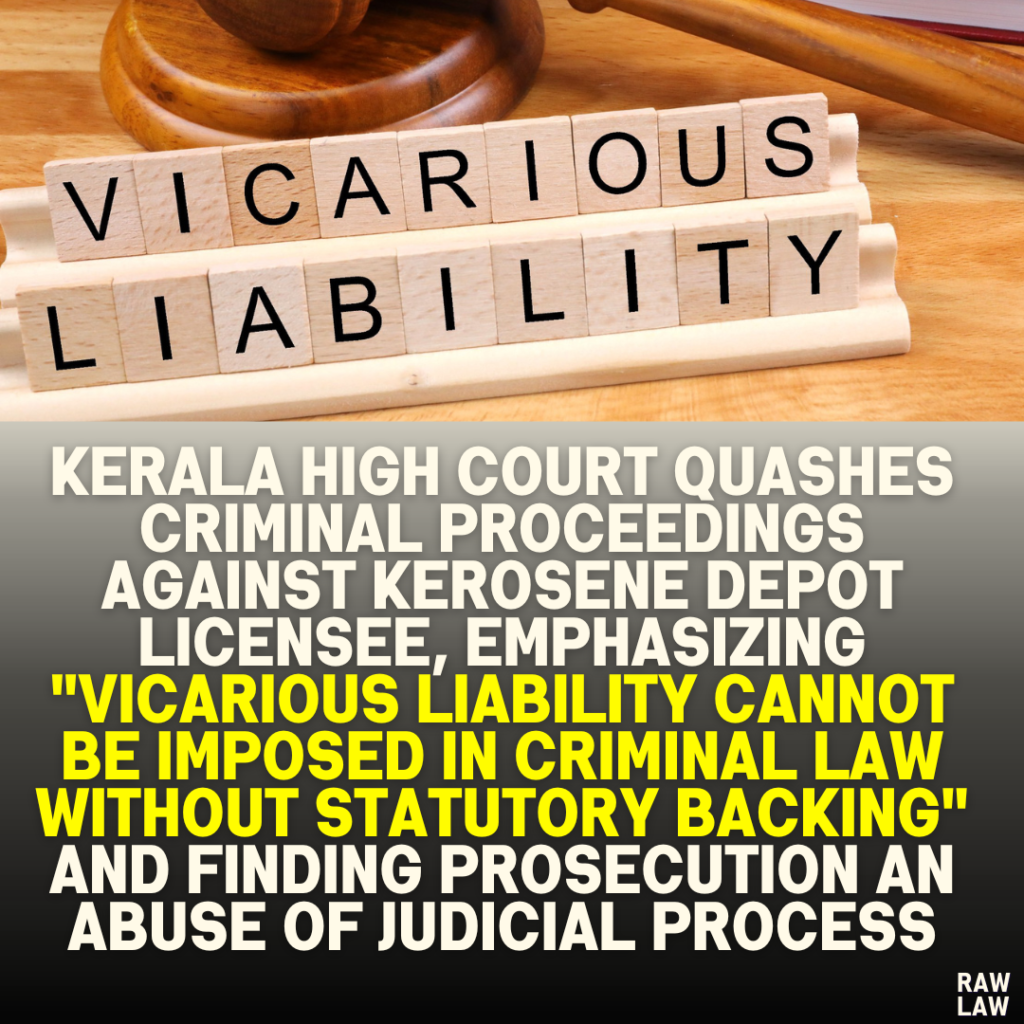Court’s Decision:
The Kerala High Court quashed criminal proceedings against the petitioner, a licensee of a kerosene depot, accused of involvement in the unauthorized diversion of kerosene. The Court held that the concept of vicarious liability in criminal law is only applicable if explicitly provided for by statute. The Court determined that continuing prosecution based on such liability amounted to an abuse of the judicial process.
Facts:
The petitioner was implicated as the 4th accused in a case concerning the alleged diversion of kerosene. A tanker lorry transporting kerosene, reportedly supplied by the Civil Supplies Corporation, was intercepted while being taken to a paint company without authorization. The police alleged that the kerosene was diverted to the premises of a private company. The crime was registered under Section 7(i)(a)(ii)(c) of the Essential Commodities Act and Section 16 of the Kerala Kerosene Control Order, 1968.
Initially, only two accused were named in the case, but the petitioner, being the licensee of Chaitram Fuels, a wholesale kerosene depot, was later implicated during the investigation. However, the petitioner contended that he had no control over the supply operations at the time of the alleged incident, as the management of the wholesale depot had already been transferred to another licensee.
Issues:
- Can vicarious liability be applied in criminal law to prosecute the petitioner in the absence of statutory provision?
- Does the continuation of proceedings against the petitioner constitute an abuse of the judicial process?
Petitioner’s Arguments:
- No Role or Knowledge of Diversion:
The petitioner argued that he was not involved in the alleged diversion of kerosene and had no active control over the depot operations. The wholesale depot in question had been detached from his management and assigned to another licensee before the incident. - Government Inquiry Findings:
A government inquiry (Annexure VI) exonerated the petitioner, finding that the diversion occurred due to the actions of depot staff and relatives of the deceased original licensee, Krishnankutty. The petitioner was not found to have any direct or active involvement. - Vicarious Liability Not Recognized in Criminal Law:
The petitioner contended that the prosecution against him was based solely on vicarious liability, which is not applicable in criminal law unless explicitly provided by statute. - Abuse of Process:
Continuation of proceedings despite lack of evidence and the government’s findings constituted an abuse of the judicial process.
Respondent’s Arguments:
The Public Prosecutor contended that the petitioner’s defense regarding his lack of involvement should be raised before the trial court and not as grounds for quashing the proceedings.
Analysis of the Law:
The Court examined the concept of vicarious liability in criminal jurisprudence, relying on the principles laid down in Ashok Kumaran @ Sabu C. v. State of Kerala [2023 (4) KHC 545]. The legal principles established are:
- No Vicarious Liability Unless Explicitly Provided:
Criminal liability cannot be imposed vicariously unless the statute explicitly incorporates such a provision. - Burden of Proof on Prosecution:
In cases involving corporate entities or licensees, the prosecution must provide evidence linking the accused to the criminal act with mens rea (criminal intent). - Judicial Scrutiny by Magistrates:
Before issuing summons or charges against individuals in managerial roles, Magistrates must evaluate whether sufficient evidence exists to establish a prima facie case of personal involvement or criminal intent.
The Court found that no statute or evidence supported the application of vicarious liability against the petitioner.
Precedent Analysis:
The Court reiterated the legal position that vicarious liability is not a principle recognized in criminal law unless specifically provided by statute. The reliance on Ashok Kumaran and similar precedents strengthened the finding that imposing criminal liability on the petitioner without evidence of active involvement was legally untenable.
Court’s Reasoning:
- Findings of Government Inquiry:
Annexure VI, the government inquiry report, unequivocally stated that the petitioner had no direct role in the alleged diversion of kerosene. The incident was attributed to actions taken by depot staff, over whom the petitioner no longer had managerial control. - No Basis for Vicarious Liability:
The Court emphasized that vicarious liability in criminal law cannot be inferred in the absence of statutory provision. The prosecution’s case was based solely on the petitioner’s status as the former licensee of the depot. - Abuse of Judicial Process:
Continuing the prosecution against the petitioner, given the lack of evidence and the findings of the government inquiry, was deemed an abuse of judicial process.
Conclusion:
The Court quashed all proceedings against the petitioner in CC No. 2265/2015, holding that the prosecution was unwarranted. The Court clarified that its order was limited to the petitioner and did not affect the case against the remaining accused, which would proceed before the trial court.
Implications:
- Reaffirmation of Legal Principles:
The judgment reinforces the principle that criminal liability must be based on direct involvement or specific statutory provisions. - Protection Against Unwarranted Prosecution:
The decision highlights the judiciary’s role in preventing the misuse of criminal proceedings to prosecute individuals without evidence. - Vicarious Liability Restricted:
By reiterating that vicarious liability is not recognized in criminal law, the ruling provides clarity for similar cases, particularly involving corporate and licensing matters.
